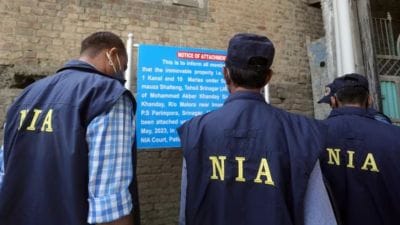Power, Pen amp; Patronage
Marathi litterateurs are on the horns of a dilemma today. They have never faced a situation where they are required to break their silenc...

Marathi litterateurs are on the horns of a dilemma today. They have never faced a situation where they are required to break their silence on issues of State funding and subsidising their activities and to come out openly in support of, or opposition to, a peculiar expectation of the rulers.
Successive generations of rulers have considered that promoting art, literature and culture is the prerogative of the government and as such the easiest way to do it is by funding wholly or partly the activities taken up by artists and litterateurs. This role of the government has come in for a lot of criticism by discerning members of the intellegentsia, because indiscreet funding is breeding and encouraging favouritism and, subsequently, mediocrity at all levels. Funding collective activities and providing financial and other help to the poor8217; and needy8217; among artists and litterateurs continued to be the aim of those in power, and it was believed this was done with the lofty objective of social justice, which is anavowed policy of any democratically elected government. This further gave rise to considerations such as regional representations, caste, etc. Every government had its own logic in allowing artists, litterateurs and sportsmen to become beneficiaries of government largesse, but the rulers8217; tacit understanding, or at least expectation, was that these members of the so-called intelligentsia will lend, if not open, at least the meek support if and when required.
Whether it was obtaining a residential flat from the 10 per cent or 2 per cent quota or financial assistance for a foreign trip or medical treatment or just plain financial help for alleviating poverty from the Chief Minister8217;s Fund, relaxing or violating rules to extend governmental help to the poor8217; and needy8217; litterateurs and artists was the responsibility willingly owned by rulers and sought by litterateurs and artists unashamedly. Though no help was ever given with grace by the government, the litterateurs and artists did not protest. There is nouse protesting, they thought, for surely that was how the government functioned in a democratic set-up. A series of letters petitioning for merciful help, frequent visits to the Chief Minister8217;s office, and, lo, their demand was met with.
In the past, the rulers, enlightened8217; as they were, rarely spoke about the favours done to litterateurs and artists. Never could the public know who the real beneficiaries of government largesse were. Every beneficiary tended to believe he or she deserved8217; the help, some even thought it was their right to be beneficiaries of governmental help. And they were all gallant men and gentle ladies serving a great social purpose by being members of the social intelligentsia! The price to be paid in return for these benefits was not very heavy: Do not oppose government policies and actions; if you cannot muster the courage to openly support it, at least keep silent; declare yourselves disinterested in politics. Stay non-committal8217; has been the habitual policy of litterateurs andartists so far, and that has suited successive governments.
When opinion-makers of society remain non-committal in this way, the government faces no risk of public upheaval, political opposition can be tackled in a different manner. As it is, everything that politicians do lacks credibility. Thus litterateurs and artists slowly came to forget their role as opinion-makers 8212; of speaking the truth, of remaining disinterested, of raising a voice against injustice, and of challenging populist decisions and actions of those in authority.
This posture of litterateurs and artists suited the government pre-eminently. The power of patronage was sufficient to control the feeble voice of dissent, if any 8212; conferring awards, subsidising their activities or creating positions for them on various boards or committees was surely a smooth way of winning them over. Added to it was their act of applauding the role and contributions of individual writers and artists publicly. What more do litterateurs and artists want fromthe authority that be?
Accustomed as litterateurs and artists were to the golden era8217; of governmental help, it was a rude shock to them when Shiv Sena supremo Bal Thackeray denounced them openly as having no social utility. He also wanted them to return the funds extended to them to meet the huge expenses by the government agencies.
The trouble began when Professor Vasant Bapat, President of the 72nd Akhil Bharatiya Marathi Sahitya Sammelan, in his address, made oblique references to the dictatorial indulgence in matters of art and literature. He was obviously referring to the recent controversies in Maharashtra when the followers of Shiv Sena had usurped at the instance of their Supremo, the role of arbiters of social taste. The audience present felt Professor Bapat8217;s denunciation of the growing intolerance and shameless display of Fascist tendency too meek and unnecessarily oblique. But the reference was enough to invite the wrath and subsequent outburst of Shiv Sena chief Bal Thackeray. Unlike therulers of yesteryear, Thackeray believes in the dictum one who pays the piper, calls for the tune.8217; He would have been happy if there were no tunes at all, but surely he does not want even a single cacophonic note.8217; He, who feels he has a right to order the government machinery as it was he who brought in the transfer of power in Maharashtra, wanted organisers of the literary meet to return the government8217;s Rs 25 lakh given by way of generous subsidy. He has also prompted the Mayor of Mumbai to issue stop payment8217; instructions to the bankers for a Rs 10 lakh cheque given to the organisers by Mumbai Municipal Corporation for the same purpose. This has caused a lot of embarrassment to the organisers of the meet and put them in a problematic situation as how to meet the expenses.
In an uncharacteristic move, Professor Bapat did not take the ire of the Supremo lying down. He retaliated by questioning Thackeray8217;s authority and said there is no favour done by the authority; it was people8217;s money given back tothe people. It has been Thackeray8217;s habit not to cogently reply to logical questions. His strength is in the abusive language. He compared, in an editorial in Saamna, the mouthpiece of his party, litterateurs to bulls in a bullbazar, a simile that sent shockwaves down the spine of litterateurs. That was too much for them to digest. Ram Shewalkar, a veteran writer and eminent public speaker in protest against the abusive language used by Thackeray, resigned from all government committees of which he was a member. He wanted the State government to declare its stand. Many more are contemplating similar action. But will they really resign? A moot point. They have never faced a situation like this before, their integrity has never been tested.
A plan is also afoot to collect a huge fund to the tune of Rs 10 crore, the interest on which will be enough to offset expenses of the annual literary meet. Are litterateurs right in severing their connections with the government, just because one powerfulextra-constitutional authority irrationally criticises them and wants them to keep their mouth shut if they are to partake of government help? Is it not necessary also to distinguish between the State and the ruling party? Is not the funding of literary and cultural activities made by the government in realisation of the higher aims of the State? It must be remembered that in the ultimate analysis, the State functions for improving the quality of life, which includes art, culture and literature. Though in realpolitik decisions are governed by political considerations, unless the State is an ideological State like Hitler8217;s Germany or Stalin8217;s Soviet Union which uses funding for promotion of a certain ideology or a certain kind of world view, the whole idea of funding of cultural or literary activities cannot be opposed or defended merely in terms of political gains. The Mayor of Mumbai, defending his instruction for stop payment8217; of the cheque issued to organisers of the Literary Meet, made a remark whichshowed how ignorant he is about the functions of the State vis-a-vis art and literature. He questioned why the litterateurs should indulge themselves in commenting on politics. It is also their job, sir. Are you recommending State-promoted art or culture? If so, why complain about the uselessness of litterateurs to society?
It is worth watching the course of events. Will the litterateurs and artists refrain from rushing to the government for every possible help, or will the Shiv Sena Supremo Bal Thackeray retract his position? Whatever happens, it will benefit both if both believed in Cocteau8217;s advice that tact consists in knowing how far to go in going too far.
Dr Tikekar is editor of Loksatta
- 01
- 02
- 03
- 04
- 05































